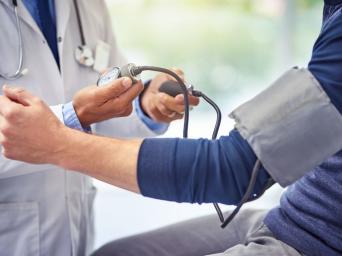Saint Luke’s News: Reduce your risk from COVID-19 and other health issues by doing this at home
When it comes to heart attack, stroke, dementia, heart failure, kidney failure, atrial fibrillation, and erectile disfunction—there is one simple thing you can do at home to significantly reduce your risk, as well as reduce your risk of complications from COVID-19.
Self-monitor your blood pressure.
This is especially important amid the pandemic, as doctors are seeing a significant increase in patients with uncontrolled high blood pressure.
“It’s likely because of this abrupt change in our lifestyles,” said Dr. Tracy Stevens, a cardiologist at Saint Luke’s Mid America Heart Institute. “Our daily routines have really been challenged, and we’re all under a lot of stress from the pandemic. I don’t think we emphasize the impact of stress on our lives and our health enough.”
Uncontrolled high blood pressure is the most neglected condition in the U.S., Dr. Stevens emphasized. If regularly monitored, high blood pressure can be controlled through lifestyle changes and medication, greatly reducing the risk for many health complications.
“It’s not what your blood pressure is once or twice a year at your doctor’s office,” Dr. Stevens said. “It’s what it is between those times—at home, at work… we need to take ownership of our own health. Do not assume if you feel well that your blood pressure is ok; high blood pressure is the silent killer."
How do I take my blood pressure reading at home?
“It’s a very easy thing to do,” Dr. Stevens stressed.
She recommends that everyone, not just her patients, buy a blood pressure cuff and keep it at home or place of work. The cardiologist checks her own blood pressure regularly with a battery-operated cuff she keeps in her house. These can be purchased from most pharmacies or online. Upper arm cuffs are best, as they are generally more accurate than wrist or finger monitors.
Doctors recommend you take your blood pressure reading at least once a month—more frequently if it’s elevated.
“Slide the cuff over your left arm, put both feet on the floor, relax, and just press start,” Dr. Stevens said. “If you find that your blood pressure is elevated, keep a regular diary of it and talk to your doctor.”
What should my numbers be, and when might I need medication?
In general, most people should aim for a blood pressure reading under 140/90—even better if it’s 130/80 or less.
For people who are at low risk, a consistent reading at or above 140/90 should warrant a conversation with your doctor about blood pressure medication. People at higher risk – for example, those who have had a heart attack, stroke, diabetes, or kidney disease – may need to start taking medication if their reading is consistently at or above 130/80.
“It’s important to check in with your health care provider based on your medical condition,” Dr. Stevens said. “Where should your goal be, and at what point do we need to think of medication or changing medication?”
What can I do to keep my blood pressure under control amid the pandemic?
There are simple things everyone can do to address the added stress, anxiety, and disruptions of the pandemic. Read more here on the five simple ways to lower your blood pressure.
Most importantly, if you find your blood pressure is elevated, act now.
“Do not wait until this pandemic is over to seek medical help,” Dr. Stevens stressed. “Come on in, get checked out. There are lots of ways to talk to your doctor now with virtual visits and the Saint Luke’s patient portal.”
We want you to feel comfortable with continually monitoring your blood pressure. Let’s not neglect the silent killer. It is very important to not delay in seeking intervention. Small changes now can have a significant impact on your health for your lifetime.”
Learn more about high blood pressure and find a doctor here.

